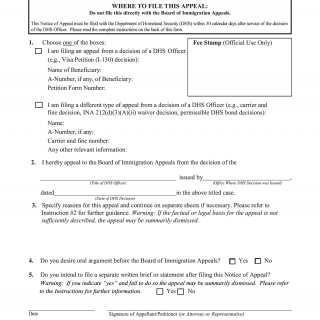Form EOIR-29. Notice of Appeal to the Board of Immigration Appeals from a Decision of a DHS Officer
Form EOIR-29 is a formal legal document utilized in the United States immigration context, specifically designed for individuals seeking to challenge decisions made by Department of Homeland Security (DHS) officers in matters related to certain immigration petitions. This form serves as a crucial avenue for those who believe that a DHS officer's decision regarding a Form I-130 (Petition for Alien Relative) or Form I-360 (Petition for Amerasian, Widow(er), or Special Immigrant) was erroneous, unjust, or improperly executed.
Appealing a DHS officer's decision can have profound implications on an individual's immigration status, familial relationships, and overall prospects within the United States. Form EOIR-29 provides a structured framework for initiating an appeal process, allowing individuals to present their arguments, evidence, and legal reasoning to the Board of Immigration Appeals (BIA) for review and reconsideration.
Key Aspects and Usage Scenarios
-
Initiating the Appeal Process: Form EOIR-29 is the initial step in appealing a DHS officer's decision. It signifies an individual's intent to contest the decision and request a thorough review by the BIA.
-
Applicability to Specific Immigration Petitions: This form is specifically intended for decisions related to Form I-130 or Form I-360. It should not be utilized for general visa application denials made by Department of State consular officers.
-
Legal Representation Requirement: The form underscores the importance of legal representation. An attorney or an accredited representative recognized by the Board of Immigration Appeals must file a separate notice of appearance on behalf of the petitioner using Form EOIR-27.
-
Structured Presentation of Arguments: Form EOIR-29 enables individuals to present clear, well-organized arguments outlining the reasons for the appeal, along with supporting evidence and legal references.
-
Correction of Misinterpretations or Errors: Individuals may use this form to contest decisions stemming from misinterpretation of facts, errors in judgment, or misunderstanding of the petitioner's circumstances by the DHS officer.
-
Reconsideration by the BIA: Upon submission of Form EOIR-29, the Board of Immigration Appeals will review the appeal, the arguments presented, and the evidence provided. The BIA may overturn the DHS officer's decision, remand the case for further review, or uphold the initial decision.
-
Impact on Immigration Status: A successful appeal can result in a reversal of the decision, potentially leading to the approval of the relevant immigration petition and consequential benefits.
How to Fill Out Form EOIR-29
1. General Information:
- You are the "appellant" if you're appealing a DHS Officer's decision.
- Include specific details about the underlying application filed with DHS. Refer to the decision of the DHS Officer for appeal instructions and requested details.
2. Filing:
- Submit this form to DHS, USCIS, or CBP.
- File within 30 calendar days if handed the decision by a DHS Officer.
- File within 30 calendar days from the date of mailing if the decision was sent by DHS.
- Do not send directly to the Board of Immigration Appeals (Board).
3. USCIS Visa Petition Denials:
- If appealing a USCIS Officer's denial of a visa petition (I-130 application):
- List beneficiary's name and "A" number at the top of Form EOIR-29.
- Only the petitioner or self-petitioner can sign Form EOIR-29.
4. Review:
- Most appeals are reviewed by a single Board Member.
- Specify reasons for requesting review by a three-Board Member panel if applicable.
5. Fees:
- Pay a non-refundable fee of $110.00 for filing the appeal.
- Use bank drafts, cashier's checks, certified checks, personal checks, or money orders.
- Payment must be in U.S. funds and drawn on U.S. financial institutions.
6. Counsel:
- You can be represented by an attorney or authorized representative.
- Only the petitioner or self-petitioner may appeal a visa petition denial.
- Attorneys or representatives must file a separate notice of appearance (Form EOIR-27) with this Notice of Appeal.
7. Briefs:
- Submit briefs, if desired, to DHS at the same office as Form EOIR-29 within the specified timeframe.
8. Oral Argument:
- Cases are considered based on the submitted record. Oral arguments may be requested and approved.
9. Summary Dismissal:
- The Board may dismiss appeals that fail to meet specific criteria, including lack of grounds, improper purpose, or untimeliness.
10. Privacy and Paperwork:
- The information you provide is mandatory to file an appeal.
- EOIR may share this information according to approved routine uses.
- The estimated time to complete this form is 30 minutes.
For further guidance, refer to the Board of Immigration Appeals Practice Manual available on the EOIR website at www.justice.gov/eoir.
Form EOIR-29 acts as a pivotal gateway for individuals to safeguard their immigration interests and rights in cases where they believe a DHS officer's decision has been wrongly reached. This comprehensive form empowers petitioners to articulate their grievances, engage in a structured legal process, and seek a fair resolution through the Board of Immigration Appeals. Given the complexities of immigration law, seeking guidance from experienced immigration attorneys or accredited representatives is advisable to ensure the appeal is effectively prepared and presented.

